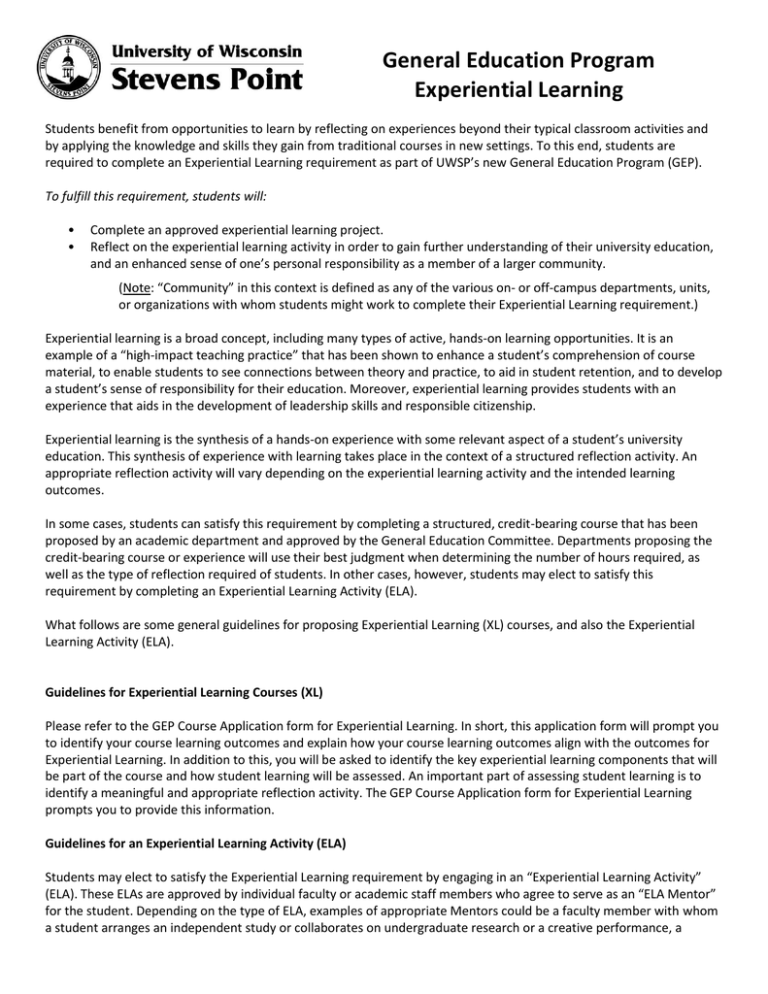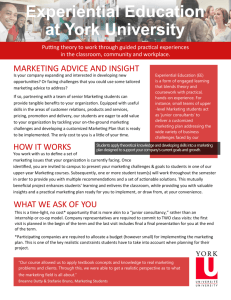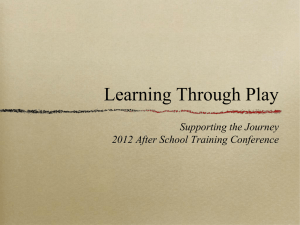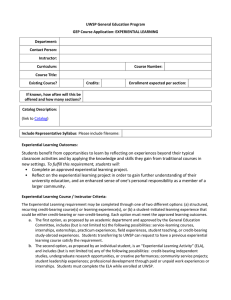General Education Program Experiential Learning
advertisement

General Education Program Experiential Learning Students benefit from opportunities to learn by reflecting on experiences beyond their typical classroom activities and by applying the knowledge and skills they gain from traditional courses in new settings. To this end, students are required to complete an Experiential Learning requirement as part of UWSP’s new General Education Program (GEP). To fulfill this requirement, students will: • • Complete an approved experiential learning project. Reflect on the experiential learning activity in order to gain further understanding of their university education, and an enhanced sense of one’s personal responsibility as a member of a larger community. (Note: “Community” in this context is defined as any of the various on- or off-campus departments, units, or organizations with whom students might work to complete their Experiential Learning requirement.) Experiential learning is a broad concept, including many types of active, hands-on learning opportunities. It is an example of a “high-impact teaching practice” that has been shown to enhance a student’s comprehension of course material, to enable students to see connections between theory and practice, to aid in student retention, and to develop a student’s sense of responsibility for their education. Moreover, experiential learning provides students with an experience that aids in the development of leadership skills and responsible citizenship. Experiential learning is the synthesis of a hands-on experience with some relevant aspect of a student’s university education. This synthesis of experience with learning takes place in the context of a structured reflection activity. An appropriate reflection activity will vary depending on the experiential learning activity and the intended learning outcomes. In some cases, students can satisfy this requirement by completing a structured, credit-bearing course that has been proposed by an academic department and approved by the General Education Committee. Departments proposing the credit-bearing course or experience will use their best judgment when determining the number of hours required, as well as the type of reflection required of students. In other cases, however, students may elect to satisfy this requirement by completing an Experiential Learning Activity (ELA). What follows are some general guidelines for proposing Experiential Learning (XL) courses, and also the Experiential Learning Activity (ELA). Guidelines for Experiential Learning Courses (XL) Please refer to the GEP Course Application form for Experiential Learning. In short, this application form will prompt you to identify your course learning outcomes and explain how your course learning outcomes align with the outcomes for Experiential Learning. In addition to this, you will be asked to identify the key experiential learning components that will be part of the course and how student learning will be assessed. An important part of assessing student learning is to identify a meaningful and appropriate reflection activity. The GEP Course Application form for Experiential Learning prompts you to provide this information. Guidelines for an Experiential Learning Activity (ELA) Students may elect to satisfy the Experiential Learning requirement by engaging in an “Experiential Learning Activity” (ELA). These ELAs are approved by individual faculty or academic staff members who agree to serve as an “ELA Mentor” for the student. Depending on the type of ELA, examples of appropriate Mentors could be a faculty member with whom a student arranges an independent study or collaborates on undergraduate research or a creative performance, a student organization advisor, a residence hall director, an academic advisor, a Student Affairs academic staff member who supervises one of the activities listed in the following examples of ELAs. Students will complete a reflection activity that synthesizes the student’s experience with an enhanced understanding of responsible citizenship, leadership, and/or the scholarly aims of a discipline. Students can complete this experiential learning requirement by engaging in at least one of the following types of Experiential Learning Activities: 1. Independent Studies, Undergraduate Research, and Creative Performances: Students can complete an ELA by engaging in an appropriate discipline-specific, credit-bearing independent study, research project, or creative performance in conjunction with a faculty supervisor or academic advisor. See the following for examples: o http://www.uwsp.edu/cnr/StudentSymposium/Pages/default.aspx o http://www.uwsp.edu/cols/Pages/ResearchSymposium/default.aspx o Participation in one of the many art, dance, music or theater opportunities offered in the College of Fine Arts and Communication. o Participation in one of the many experiential learning activities in athletics, business, education, health or wellness offered in the College of Professional Studies. o Serving community needs in the Stevens Point area. 2. Community Service Projects: Students can complete an ELA by engaging in a community service project. Examples include: o A Foreign Language major volunteers to tutor for a local literacy council. o A Women’s Studies minor volunteers for Sexual Assault Victim Services. o An English or Communication major volunteers to put together a newsletter for a local community group. 3. Student Leadership Experiences: Students can complete an ELA by participating as leaders in Student Government, holding officer positions in student organizations recognized by the Student Involvement and Employment Office (SIEO) , or participating in Residence Hall activities. Students must do more than just attend meetings as an organization member or hall resident, however. Students must hold an officer position or some other position that has significant responsibilities. See the following for examples: o http://www.uwsp.edu/stuorg/sga/ o http://www.uwsp.edu/centers/sieo/Pages/default.aspx o http://stuorgs.uwsp.edu/rha/pages/home.aspx 4. Professional Development through Paid or Unpaid Work Experiences or Internships: Students can complete an ELA in paid or unpaid work experiences and summer internships. Examples include: o A student (in any major) who plans to work in human resources sets up a job shadow with a retail store manager where she/he has a part-time job. o A student completes a non-course-based internship. o A History major or Anthropology minor works as a guide in a museum during the summer.



